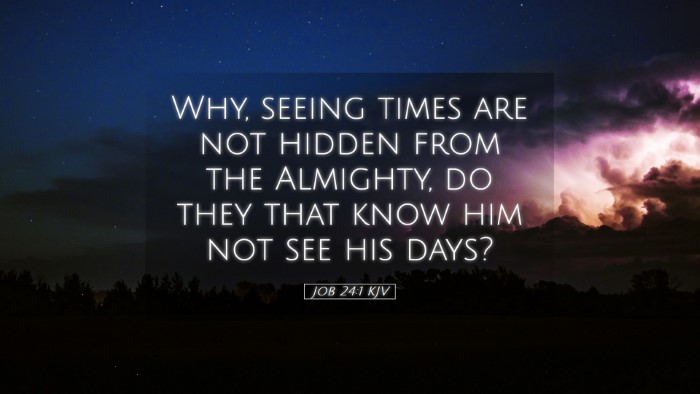Old Testament
Genesis Exodus Leviticus Numbers Deuteronomy Joshua Judges Ruth 1 Samuel 2 Samuel 1 Kings 2 Kings 1 Chronicles 2 Chronicles Ezra Nehemiah Esther Job Psalms Proverbs Ecclesiastes Song of Solomon Isaiah Jeremiah Lamentations Ezekiel Daniel Hosea Joel Amos Obadiah Jonah Micah Nahum Habakkuk Zephaniah Haggai Zechariah MalachiJob 24:1
Job 24:1 KJV
Why, seeing times are not hidden from the Almighty, do they that know him not see his days?
Job 24:1 Bible Commentary
Commentary on Job 24:1
Job 24:1: "Why, seeing times are not hidden from the Almighty, do they that know him not see his days?"
Contextual Overview
The Book of Job presents a profound examination of suffering and divine justice. In this verse, Job questions why the wicked seem to prosper, challenging the perception of divine oversight. This verse encapsulates the broader themes of injustice and the mystery of God's governance over the world.
Insights from Public Domain Commentaries
Matthew Henry's Commentary
Matthew Henry highlights the perplexity of Job's situation, emphasizing that God's providence often defies human understanding. Job's lamentation arises from his observation that injustice appears prevalent, and yet, God remains omniscient and omnipotent. Henry points out that Job is not calling into question God's power but rather struggles with the apparent distance between divine justice and human experience.
He further suggests that this situation poses an essential inquiry for believers, stirring curiosity about the divine timing and the hidden ways of God. Henry mentions that while the righteous may endure hardship, the wicked prosper, demonstrating a paradox that calls for deep faith in God's ultimate justice, even when it remains concealed.
Albert Barnes' Notes on the Bible
Albert Barnes interprets Job's despair as an echo of the timeless struggle between faith and the observable reality of suffering. He observes that Job's question implies a challenge to God’s justice, implying that a close relationship with God ought to yield insight into His workings. Barnes stresses that while Job’s feelings of confusion are legitimate, they also reflect a misunderstanding of God's overarching plan.
Additionally, Barnes expounds on the phrase "do they that know him not see his days," suggesting that the wicked, despite their apparent victories, are blind to the fleeting nature of their success. He argues that this blindness signifies a deeper spiritual ignorance that ultimately leads to destruction.
Adam Clarke's Commentary
Adam Clarke provides a historical and theological perspective on Job's inquiry. He notes that Job perceives the judicial system of the world as inequitable, wherein the wicked seem to escape accountability. Clarke elaborates on the significance of the term "days," contemplating its meaning in the context of divine judgment. He posits that Job is not merely speaking of daily activities but is alluding to the appointed time when God will set all wrongs right.
Clarke emphasizes the necessity of faith in the character of God, reminding the reader that, despite appearances, God is always at work in His creation. He further underscores that while God may allow the wicked temporary success, they remain oblivious to their impending justice.
Theological Implications
The implications of Job 24:1 resonate within theological discussions concerning divine justice and human suffering. The verse invites pastors, theologians, and scholars to engage with the complexities of God's sovereignty in the face of apparent injustices in the world.
- God's Sovereignty: The acknowledgment that though God is all-knowing, His ways are often inscrutable to human understanding.
- The Nature of Evil: Job's inquiry reflects a profound wrestle with the existence of evil and the moral order of the universe.
- Faith Amidst Confusion: It illustrates the necessity of faith, even when God's purposes are not clear, emphasizing that God ultimately desires a relationship grounded in trust.
Conclusion
Job 24:1 remains a poignant reflection on the human experience of suffering and the quest for understanding divine justice. Through the insights of various commentators, readers are encouraged to grapple with the complex interplay between faith and experience. While Job's questioning reflects a profound honesty, it also invites deeper trust in God's character and the assurance that He has a larger plan, even amidst the chaos of life.


